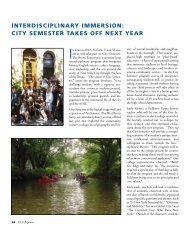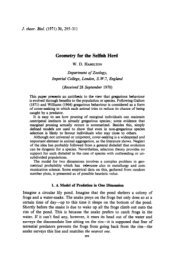John Hobson: Imperialism, 1902 Source: Modern History ...
John Hobson: Imperialism, 1902 Source: Modern History ...
John Hobson: Imperialism, 1902 Source: Modern History ...
Create successful ePaper yourself
Turn your PDF publications into a flip-book with our unique Google optimized e-Paper software.
<strong>John</strong> <strong>Hobson</strong>: <strong>Imperialism</strong>, <strong>1902</strong><br />
<strong>Source</strong>: <strong>Modern</strong> <strong>History</strong> <strong>Source</strong>Book; From <strong>John</strong> A. <strong>Hobson</strong>, <strong>Imperialism</strong> (London:<br />
Allen and Unwin, 1948),pp.3-5 71-72,77-78,80-81,92-93.<br />
<strong>John</strong> A. <strong>Hobson</strong> (1858-1940), an English economist, wrote one the most famous critiques<br />
of the economic bases of imperialism in <strong>1902</strong>.<br />
No mere array of facts and figures adduced to illustrate the economic nature of the new<br />
<strong>Imperialism</strong> will suffice to dispel the popular delusion that the use of national force to<br />
secure new markets by annexing fresh tracts of territory is a sound and a necessary policy<br />
for an advanced industrial country like Great Britain....<br />
- But these arguments are not conclusive. It is open to Imperialists to argue thus: "We<br />
must have markets for our growing manufactures, we must have new outlets for the<br />
investment of our surplus capital and for the energies of the adventurous surplus of our<br />
population: such expansion is a necessity of life to a nation with our great and growing<br />
powers of production. An ever larger share of our population is devoted to the<br />
manufactures and commerce of towns, and is thus dependent for life and work upon food<br />
and raw materials from foreign lands. In order to buy and pay for these things we must<br />
sell our goods abroad. During the first three-quarters of the nineteenth century we could<br />
do so without difficulty by a natural expansion of commerce with continental nations and<br />
our colonies, all of which were far behind us in the main arts of manufacture and the<br />
carrying trades. So long as England held a virtual monopoly of the world markets for<br />
certain important classes of manufactured goods, <strong>Imperialism</strong> was unnecessary.<br />
After 1870 this manufacturing and trading supremacy was greatly impaired: other<br />
nations, especially Germany, the United States, and Belgium, advanced with great<br />
rapidity, and while they have not crushed or even stayed the increase of our external<br />
trade, their competition made it more and more difficult to dispose of the full surplus of<br />
our manufactures at a profit. The encroachments made by these nations upon our old<br />
markets, even in our own possessions, made it most urgent that we should take energetic<br />
means to secure new markets. These new markets had to lie in hitherto undeveloped<br />
countries, chiefly in the tropics, where vast populations lived capable of growing<br />
economic needs which our manufacturers and merchants could supply. Our rivals were<br />
seizing and annexing territories for similar purposes, and when they had annexed them<br />
closed them to our trade The diplomacy and the arms of Great Britain had to be used in<br />
order to compel the owners of the new markets to deal with us: and experience showed<br />
that the safest means of securing and developing such markets is by establishing<br />
'protectorates' or by annexation....<br />
It was this sudden demand for foreign markets for manufactures and for investments<br />
which was avowedly responsible for the adoption of <strong>Imperialism</strong> as a political policy....<br />
They needed <strong>Imperialism</strong> because they desired to use the public resources of their<br />
country to find profitable employment for their capital which otherwise would be<br />
superfluous....
Every improvement of methods of production, every concentration of ownership and<br />
control, seems to accentuate the tendency. As one nation after another enters the machine<br />
economy and adopts advanced industrial methods, it becomes more difficult for its<br />
manufacturers, merchants, and financiers to dispose profitably of their economic<br />
resources, and they are tempted more and more to use their Governments in order to<br />
secure for their particular use some distant undeveloped country by annexation and<br />
protection.<br />
The process, we may be told, is inevitable, and so it seems upon a superficial inspection.<br />
Everywhere appear excessive powers of production, excessive capital in search of<br />
investment. It is admitted by all business men that the growth of the powers of production<br />
in their country exceeds the growth in consumption, that more goods can be produced<br />
than can be sold at a profit, and that more capital exists than can find remunerative<br />
investment.<br />
It is this economic condition of affairs that forms the taproot of <strong>Imperialism</strong>. If the<br />
consuming public in this country raised its standard of consumption to keep pace with<br />
every rise of productive powers, there could be no excess of goods or capital clamorous<br />
to use <strong>Imperialism</strong> in order to find markets: foreign trade would indeed exist....<br />
Everywhere the issue of quantitative versus qualitative growth comes up. This is the<br />
entire issue of empire. A people limited in number and energy and in the land they<br />
occupy have the choice of improving to the utmost the political and economic<br />
management of their own land, confining themselves to such accessions of territory as are<br />
justified by the most economical disposition of a growing population; or they may<br />
proceed, like the slovenly farmer, to spread their power and energy over the whole earth,<br />
tempted by the speculative value or the quick profits of some new market, or else by<br />
mere greed of territorial acquisition, and ignoring the political and economic wastes and<br />
risks involved by this imperial career. It must be clearly understood that this is essentially<br />
a choice of alternatives; a full simultaneous application of intensive and extensive<br />
cultivation is impossible. A nation may either, following the example of Denmark or<br />
Switzerland, put brains into agriculture, develop a finely varied system of public<br />
education, general and technical, apply the ripest science to its special manufacturing<br />
industries, and so support in progressive comfort and character a considerable population<br />
upon a strictly limited area; or it may, like Great Britain, neglect its agriculture, allowing<br />
its lands to go out of cultivation and its population to grow up in towns, fall behind other<br />
nations in its methods of education and in the capacity of adapting to its uses the latest<br />
scientific knowledge, in order that it may squander its pecuniary and military resources in<br />
forcing bad markets and finding speculative fields of investment in distant corners of the<br />
earth, adding millions of square miles and of unassimilable population to the area of the<br />
Empire.
















